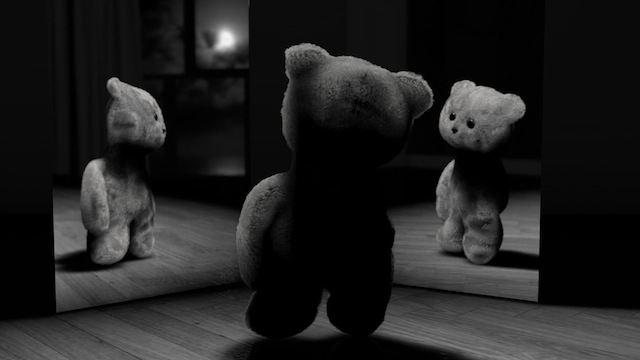Off Vendome, New York 19 January – 4 March
“I think it’s really a deep memory: it must have been from when I was very young,” reads the first English subtitle of Juan Antonio Olivares’s ten-minute HD-projected animation Moléculas (2017). The opening shot pans from darkness to the furry feet of a teddy bear, then slowly upwards to reveal the bear’s belly, and finally its plaintive face. The bear’s mouth is moving; it would seem that it is he who is speaking the words of the Spanish soundtrack. As the shot moves to a wider angle, the bear is revealed to be missing an arm. Ted goes on to recall how, as a baby, he crawled out the front door of the family home – situated near a copper mine – because it had snowed and he was curious.
The bear is sat on a therapist’s couch. As he gets up from his horizontal position and limps over to a mirror, the ‘camera’ passes through the back of the bear’s head, entering into his white stuffing-filled insides. Ted recalls his mother: what she looked like, how she was. There is an unscripted, hesitant feel to the monologue. We take on Ted’s point of view, staring at his unblinking reflection as he notes, sadly, that his mother’s life in the mining town was tough, that “she was forty but looked like a woman of sixty”. The bear finds a photograph of a bathroom and designs for a house on the therapist’s desk, and we then ‘enter’ the image of the bathroom, which in turn starts to fill with water from an overflowing bath – the memories get more painful. How Ted’s mother loved him more than his brother; his mother’s death; how he missed her funeral.
The bear begins to weep.
We never find out whose story this really is, for what body the bear is an avatar – it doesn’t matter. It is the motif of the teddy bear that does. Such bears exist to be filled with emotions; stuffed with childhood anxieties, a steadfast friend when the world is an alienating place. And then adulthood encroaches and their magic disappears. The life falls from them; they are forgotten about or discarded (though the world doesn’t get any less tricky of course).
Yet Moléculas is not about the social and psychological use of toys per se – though certainly we can recall Mike Kelley’s work on emotion as a commodity here – but about us and our finite bodies and how we are also packed with memories and emotions, feelings and thoughts, until the moment we too are not. In the last scene of the video, the bear explodes – slowly, silently – into fragments that fall across the therapist’s office. Death is a subject of art for the ages, but this work brings with it such delicacy of feeling – as the viewer becomes seduced by the anthropomorphism – counterbalanced by the shocking ending, that one does not begrudge the return to such a theme.
First published in the May 2017 issue of ArtReview
